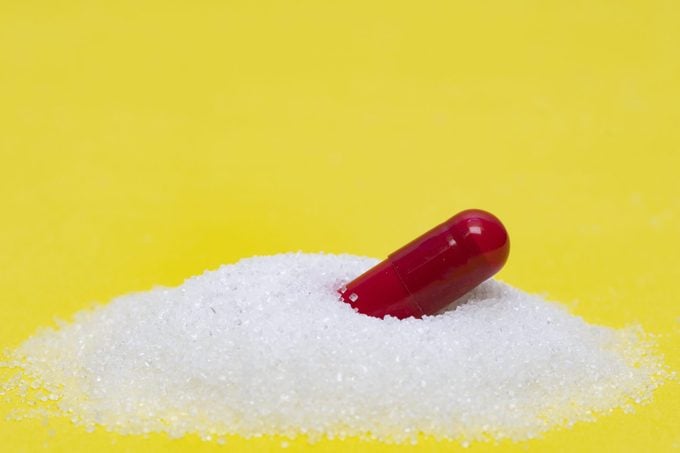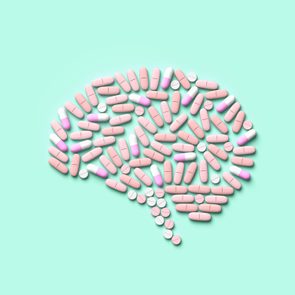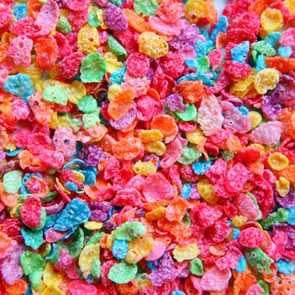Does the Supplement L-Glutamine Lower Blood Sugar? Dietitians Weigh In
Updated: May 11, 2022
L-glutamine is getting buzz for its purported role in stabilizing blood sugar. Is this true—and can it also bust cravings? Here's where the science stands.

Editor’s note: This article was medically reviewed by Sandra Bonat, MD, an endocrinologist on Long Island, NY
Why do I crave sugar?
Whether you’re trying to lose weight, prevent cavities, or go easier on your heart and blood sugar, reducing your sugar intake is one of the simplest commitments that can improve your overall health…but that still doesn’t mean it’s easy.
In fact, if it seems like the game is rigged against you, it sort of is. “Our brain releases the chemical dopamine when we eat food,” says Natalie Allen, MEd, RD, is a registered dietitian and clinical assistant professor of biomedical sciences at Missouri State University, as well as a dietitian for the St. Louis Cardinals Major League Baseball team. “Sugary foods cause more dopamine to be released, which triggers the body to want more of this pleasant chemical, leading to cravings.”
So you get cravings…but do you get cravings? Read Nutrition Pros Just Revealed What 12 Common Food Cravings Secretly Suggest about Your Health
“How can I control sugar cravings?”
There are other processes at play that encourage our taste for sugar, too, explains Emily Clairmont, MS, CD, a registered dietician with the University of Vermont Medical Center. Clairmont says many cravings stem from low blood sugar, which prompts the body to crave the carbohydrates that raise levels back into a normal range.
Still, not all carbs are created equally. If we give into a craving for simple carbohydrates, like the white table sugar in cookies or cakes, sure—they’ll satisfy this craving quickly. However the feeling won’t last.
That’s why one of the best ways to beat sugar cravings is with complex carbohydrates that supply a steadier dose of sugar into the bloodstream, like sweet potatoes, whole grains, and fruits. (What’s more, pairing these complex carbs with a source of protein may unwind your sugar cravings even more—read Craving Sugar? A Dietitian Says You May Need More of This Surprising Nutrient.)
But for better or worse, we’re creatures of habit. If you’re used to eating certain foods during specific activities or times of the day, you create external cues that can trigger a mental, emotional craving, Clairmont says. That’s why effectively cutting back on sugar can often involve forming new habits, like talking with your healthcare provider about whether any dietary supplements could help.
One supplement that’s getting buzz related to sugar is L-glutamine. Could it help cut through your sugar craze?
“How bad is sugar for me, really?” This Is Your Brain on Sugar: A Dietitian Details How a Love for Sweets May Worsen Your Memory
Does glutamine lower blood sugar?
Glutamine is an amino acid, one of the building blocks of protein. Sometimes you’ll hear it referred to as “glutamine,” while other times it’s called “L-glutamine.” The difference? Explains our medical reviewer, endocrinologist Sandra Bonat: “L-glutamine is the form of glutamine that is found in food and supplements, but often the term glutamine is used interchangeably with l-glutamine when referring to supplementation, so you can use either term.”
Good to know. As for yanking your sweet tooth? The theory is that glutamine may play a role in blood sugar regulation, Clairmont says—specifically, blood glucose genesis (its production in the liver) and metabolism. The idea is that this helps because when blood sugar is more stable, the body doesn’t need to try and pull us out of a sugar crash with a craving.
One 2020 study published in Nutrition & Metabolism lends some plausibility to this theory, finding that glutamine supplementation could help individuals with diabetes reduce and control their blood glucose levels. Still, while its effect on blood sugar appears promising, any influence it has on sugar cravings is purely anecdotal. “Besides being a supportive nutrient, the literature is not completely accurate in defining how glutamine would directly impact sugar cravings,” Clairmont explains.
What are the health benefits of glutamine?
While the jury’s out on whether glutamine will take the edge off your sugar craze, research continues to explore its other roles in the body. The amino acid is essential for maintaining a healthy immune system, and research from Nutrients suggests that supplementation may help your body heal from infection, illness, or injury. In fact, L-glutamine has been shown to help people with severe burns recover from their injuries, according to research in Nutrition in Clinical Practice. But while it’s often marketed as a sport supplement for athletes, a 2018 review of studies published in Clinical Nutrition concluded that glutamine has shown no meaningful effect on athletic performance, body composition, or post-workout recovery.
The nutrient may also contribute to intestinal health, Clairmont says. A review published in the International Journal of Molecular Science shows that glutamine is important for intestinal cell production and protection—and it even suggests a relationship between low glutamine levels and conditions like inflammatory bowel disease (IBD). New research published in Food Science and Human Wellness says glutamine supplementation may also help support a healthy gut microbiome. Given what we’re learning about the gut-brain connection, the researchers believe this amino acid may have potential in treating mental health conditions like depression. (Read Healing My Gut with Probiotics Relieved My Depression: I Tried It)
Still, much more research is needed to clarify and understand glutamine’s possible health benefits, the experts emphasize.
How to take glutamine
“Research shows short-term supplementation of glutamine is not harmful, but it might not be beneficial, either,” Allen says. This is because the body can usually make this amino acid on its own—so only under certain circumstances does a deficiency seem to occur. According to research published in Nutrition in Clinical Practice, this includes conditions that put the body under considerable stress, like critical or chronic illness, infection, trauma, cancer, and gastrointestinal disorders. In such cases, extra glutamine may be helpful but should be taken under the guidance of a physician.
That said, glutamine is a very safe supplement, according to Clairmont. However, it might have adverse effects in people taking anticonvulsant medications, who have liver disease, bipolar or seizure disorders, or who have sensitivities to MSG (glutamates).
Most people take glutamine in a powder form, she adds, though it is available in a capsule or tablet. While there isn’t enough available research to support a dosage recommendation, most preparations come in five-gram (5 g) portions.
“When taking glutamine to get any of the theorized effects, it’s recommended to take the supplement away from any food—30 minutes before or one hour after a meal,” she explains. Because glutamine is an amino acid, consuming it with other proteins may minimize its effect.
Clairmont also says that no matter what supplements you take, it’s always a good idea to learn more about where it comes from and the reputation of the manufacturer or company. “The Office of Dietary Supplements is a great resource to learn about dietary supplement standards and regulations,” she says. “It can be very helpful to know if a product has been third-party tested for purity or batch-tested to confirm supplement label claims.”
But, before beginning any new supplementing routine, be sure to talk with a licensed medical professional.
Sign up for The Healthyd @Reader’s Digest daily newsletter, and follow us on Facebook and Instagram. Also, keep reading:
- The 4 Best Vitamin D Supplements Depending on Your Specific Needs, from Registered Dietitians
- 7 Genius Nutrition Hacks a Dietitian Just Inspired Us to Try
- Is Magnesium Glycinate a Sleep Game-Changer? Here’s Why a Dietitian Gives This Supplement a Nod
- 12 Best Small Treadmills for Your Home or Apartment, According to Certified Fitness Experts
- A Bone Health Doctor Just Listed the 12 Best Yoga Poses to Strengthen Bones























